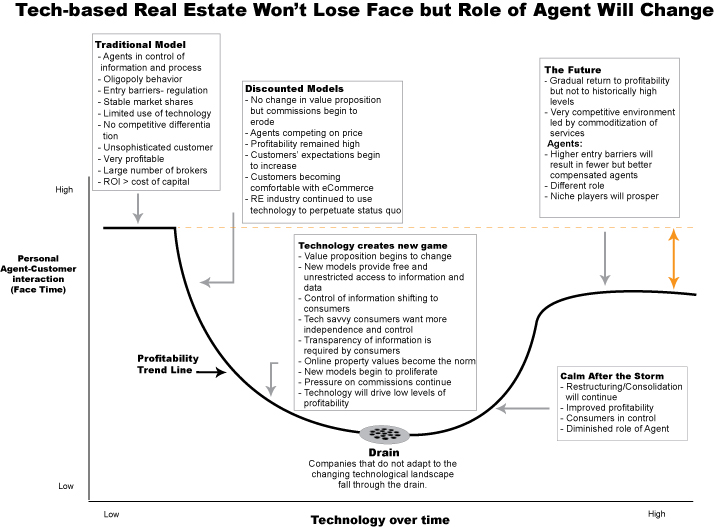
|
News
|
Homekeys.net
Tech-based Real Estate Won't Lose Face
January 1, 2007
Manuel Iraola
|
The real estate industry is being changed by companies like Zillow, FNIS, RealEstateABC, Trulia, Redfin, ZipRealty and others including our own Homekeys.
All these companies have different business models but share a passion for change and the use of technology for the benefit of the consumer. From free and unlimited access to data, information and resources (previously the exclusive domain of real estate professionals) to significantly lower transaction costs and anything in between.
The incumbents appear to be concerned about the increased use of technology and how it will impact the traditional business model including the role of the real estate agent. With great conviction, the new entrants are pushing the envelope, innovating and preaching the consumer mantra to stake their claim in this $65 billion industry. This has become a fundamental area of debate and unrest within the industry participants, consumer watchdogs and regulatory bodies. No one is to blame, as each party is doing its duty to protect their interests. The answer, however, is being hinted by the consumers.
Click here to see this chart

We believe the face of the real estate agent will be human but technology will be the heart and soul. Empowering technology will afford consumers a more active role in the transaction process, freeing the real estate agent to spend more time providing value with expertise, guidance and attention to transaction details.
Technology will never displace the human factor; it delivers 24 hours a day, 7 days a week. Consumers will conduct business on their time, not anyone else’s. They want to know that when assistance is needed, someone will be available in a reasonable amount of time. Whether that is on the phone, email, text message or web chat is not important. Physical access is not always required and not always desirable. Technology works when the consumer is empowered and has access to the people and resources they demand when they demand it. Access should not require anyone to leave the comfort of their home or office.
There will always be a role for the agent, yet there will be fewer agents and their roles will be different. Because of technology, the industry will become more transparent, more professional and more efficient. Today’s consumers are fiercely independent and technologically sophisticated. They have become increasingly familiar and comfortable with eCommerce and all sorts of “online social encounters”. Our clients grew up with toys like mobile phones, laptops, the Internet, blackberries, and companies like Google, Yahoo, AOL, Expedia, Ebay, Amazon, Realtor.com, Lending Tree and hundreds of others. They even date online and are willing to share their lives on blogs and in sites like My Space. These trends are expected to continue. Our industry, like all others, is completely reliant on its consumer base; does it seem logical to presume that it will be immune to these structural and permanent changes in consumer behavior?
Our industry is not immune. We will have to embrace change sooner rather than later. Agents will be challenged to keep abreast of the latest technological developments in a world of increasing consumer expectations. Technology will redefine the barriers of entry to the industry and its adoption will play a major role in the success or failure of the real estate professional. It should not come as a surprise that historically these barriers have been among the lowest of any industry. Technology will flush the pipeline. There will be fewer agents and their role will be less that of “matchmaker” and more that of “advisor”. Technology will bring down commissions but agents will net more because there will be fewer but significantly more productive agents.
Tech-based real estate companies will streamline and automate all processes that can be automated within the value chain. Short of conducting physical property inspections, consumers will be able to complete the majority of tasks online while relying on interaction with real estate professionals for their expertise when necessary. Online consumers can already conduct powerful map searches, estimate property values, get neighborhood info and comparable sales, view satellite images and county data. It may not be long before they schedule virtual viewing appointments and use ground level photography and advanced mapping to drive around the neighborhood. They’ll then walk around the inside of a home with their remotely conferenced agent and his counterpart asking their questions. If they like the home, they may proceed to virtually drive the comps.
Technology cannot longer be hoarded to perpetuate the existing business model and the traditional roles of agents. Other industries tried and failed because consumer expectations would not allow it. And life is too short to pursue regulation and legislation as the drivers to preempt competition.
Change is here to stay. Change fuels innovation and creativity and is a prerequisite for progress.
The companies and real estate professionals that provide and leverage technology will increase the value of "face-time". Consumers will be able to take a more active role and the real estate professional will spend their time where they provide the most value: delivering expertise, guidance and attention to transaction details. Those companies will be rewarded by the consumer.
After all, it is always the consumer, who has the final word!
|
|
|
|
|
|










